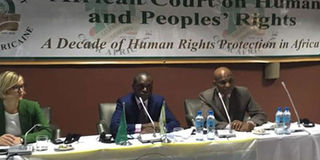African court keen to share judicial knowledge

African Court on Human and Peoples' Rights President Justice Slyvain Ore (centre) during a training for senior editors and journalists at Mount Meru Hotel in Arusha on September 8, 2016. PHOTO | LUCAS BARASA | NATION MEDIA GROUP
Arusha. In a bid to share judicial knowledge, the African Court on Human and People's Rights (AfCHPR) will from today (Sunday) play host to a high level delegation of judges from the Economic Community of West African States (Ecowas).
"The visit is a continuation of strengtening ties with the regional Courts and learn best practices with a view to enhancing and incorporating highest standards in the dispensation of justice in the continent" , said Justice Sylvain Ore, the AfCHPR President.
The visiting seven Abuja-based judges led by the President Justice Jerome Traore will hold talks with their African Court counterparts in Arusha on the protection of human rights in particular and the administration of justice as a whole.
The trip has been organized also with a view of exchanging experiences and sharing judicial knowledge among the top legal fraternity in Africa, according to the African Court's communication manager SukhdevChhatbar.
Other members of the delegation are Justice YusifKaba (Vice-President), Justice MahalmadaneHeméyeFouné (Dean of Judges), Justice Yaya Boiro, Justice Maria Do Ceu Silva Monteiro, Justice Chijioke Friday Nwoke and Justice AliouneSall.
The Registry staff in the team are: Mr Tony MaidohAnene (Chief Register), MrAthanaseAtannon (Deputy Register), Mr William Towah (Director of Finance and Administration), DrOusmane Diallo (Director of Documentation and Research), Mr Eric KwaoviAkuete (Chief of Protocol) and Mr Sunny Ugoh (Chief of Communication Division).
The delegation will also pay courtesy visits to the East African Court of Justice (EACJ) and the UN- Mechanism for International Criminal Tribunals (MICT), both based in Arusha.
The AfCHPR and ECOWAS-CCJ will also sign a Memorandum of Understanding (MoU), he further said in a statement to the media.
The AfCHPR, which is a judicial organ of the African Unbion, was established by virtue of Article 1 of the Protocol to the African Charter on Human and Peoples' Rights.
It was set up to complement the protective mandate of the African Commission on Human and Peoples’ Rights, with a view to enhancing the protection of human rights on the continent.
The ECOWAS Court of Justice is an organ of ECOWAS, a regional integration community of 15 member states in West Africa. Although ECOWAS was founded in 1975 by the Treaty of Lagos.
However, the Court of Justice was not created until the adoption of the Protocol on the Community Court of Justice in 1991.
Additionally, the ECOWAS Revised Treaty of 1993 established the Court of Justice as an institution of ECOWAS. The Protocol was amended twice; once in 2005, and again in 2006.
The 2005 Supplementary Protocol expanded the Court's jurisdiction to include human rights claims by individuals.
The African Court, on the other hand, was established in 1998 when the then Organization of African Unity (OAU) members appended their signatures to its creation.
It was, however, operationalized in 2006 when the first judges were elected. The following year (2007), it relocated to Arusha from Banjul, the Gambia.
However, todate only 30 countries out of the 55 AU member states have ratified the protocol that established it and only eight have signed a Declaration that allowed individuals and NGOs to acces the Court directly.



